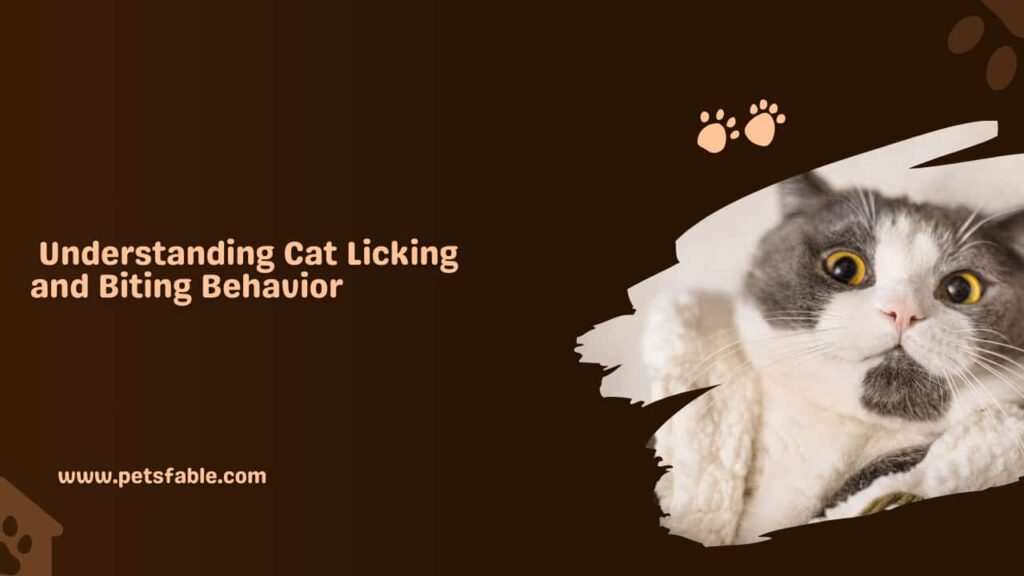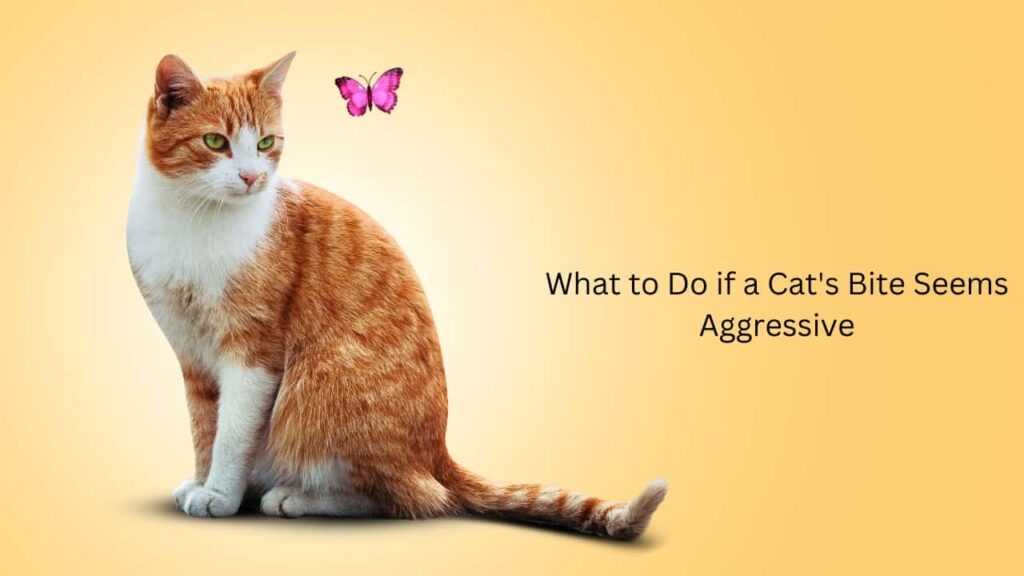What Causes Cat Licking and Biting Behavior? How to Handle It?
Cat Licking and Biting as a way to communicate, blending affection with a hint that they might need a break.
This action, referred to as ‘love biting,’ happens when what starts as licking, a display of fondness, turns into a gentle bite, which could signify playfulness or a request for personal space.
Recognizing this behavior pattern helps in responding correctly to your cat’s mixed signals, thus strengthening your relationship and avoiding any misunderstandings.
Understanding Cat Licking and Biting Behavior
If you’re wondering why your cat licks and then bites you, it’s crucial to understand this behavior as a mix of affection and a hint that they might want some space. This action often begins with licking, a gesture of fondness similar to how cats groom each other.
A subsequent bite, however, may mean your cat is feeling overstimulated or is shifting to a playful mood.
Learning to recognize these signals is key to appropriately responding to your cat’s needs, fostering a peaceful living situation. This guide provides insights to help make your interactions with your feline friend more enjoyable and less confusing.

Causes and Handling of Cat Licking and Biting Behavior
Understanding why cats bite can help avoid discomfort and improve your bond with your pet. Cats often use biting as a form of communication; it can express playfulness, overstimulation, or stress.
Observing your cat’s body language can reveal why they bite, allowing you to respond effectively and strengthen your connection.
Key Reasons for Sudden Cat Licking and Biting
- Overstimulation: Sometimes a cat has had enough interaction, and what starts as purring might escalate to biting. Recognizing this shift in their mood is crucial to preventing misunderstandings and keeping your relationship with your cat comfortable.
- Understanding Cat Overstimulation: Overstimulation varies widely among cats, manifesting as discomfort signs like biting during long petting sessions. It’s vital to notice and respect these signals, such as clawing during belly rubs or biting after extended affection, to maintain stress-free interactions.
By learning and respecting these behavioral cues, you can create a safer and more loving environment for both you and your cat.
Read more: Key Reasons for Sudden Cat Licking and Biting
How to Prevent Overstimulating Cat Licking and Biting?
To keep your interactions with your cat positive and avoid overstimulation, consider these simple guidelines:
- Respect Boundaries: Avoid touching areas your cat dislikes to prevent discomfort.
- Watch for Discomfort Signs: Stop petting immediately if you notice any signs of discomfort to maintain trust.
- Short Petting Sessions: Keep interactions brief to avoid overwhelming your cat.
- Allow Downtime: Give your cat breaks between interactions to make petting more welcome next time.
- Avoid Negative Responses: Never yell or punish your cat after a bite; such actions can cause fear or aggression.
Following these guidelines will help cultivate a tranquil and trusting relationship with your feline friend.
Why Does My Cat Hug My Arm and Bite Me?
This behavior is often a redirected hunting instinct rather than aggression. When your cat grabs and ‘bunny kicks’ your arm, they’re displaying natural behaviors meant for prey.
Provide your cat with appropriate toys, like kicker toys, to allow them to express these instincts safely, keeping playtime fun and safe for both of you.
Why Does My Cat Licking and Biting and Not My Partner?
Your cat’s biting could be due to fear, overstimulation, or mistaking playful interactions for threats. Increased play or misreading their body language could lead to bites. Understanding these triggers and adjusting your interactions can help minimize biting incidents.
Read more: Why Does My Cat Licking and Biting and Not My Partner
What Should I Do When My Cat Licking and Biting?
Stay calm and give your cat space to de-escalate. Treat any wounds promptly and observe your cat’s behavior to identify triggers. Consulting with professionals like vets or behaviorists might be necessary if the biting persists or seems unusual.
How Can I Stop My Cat Licking and Biting Me?
- Provide Safe Spaces: Allow access to hideouts for stress relief.
- Respect Their Space: Give your cat space when they appear stressed.
- Create a Calm Environment: Keep their environment quiet with essentials within reach.
- Engage with Suitable Toys: Use toys to satisfy their hunting instinct without leading to aggressive interactions.
- Limit Interaction: Monitor and limit the duration of your play and petting sessions to prevent overstimulation.
Analysis: An Attack or a Way of Communicating?
Cats bite for a variety of reasons—whether as part of play, a response to threats, or to manage overly intense human interactions.
Recognizing whether a lick followed by a bite is an affectionate gesture or a polite request for space is key to understanding and responding to your cat’s complex social signals.
What is a Love Bite in Cats? Understanding Affectionate Cat Licking and Biting
If your cat licks you and then gives a gentle bite, this is commonly known as a love bite. This behavior is a normal part of how cats communicate, especially among kittens, and is a way they show affection.
Although it might feel a bit rough due to their tongues, it’s usually not meant to cause harm.
This type of bite often means your cat is either showing love or asking for attention. Cats value their independence and prefer to initiate interactions on their own terms.
Also read: Can-dogs-have-vanilla-ice-cream-follow-a-vets
When they lick and then bite, they might be indicating their desire for affection or reminding you that they enjoy engaging with you when they choose to.
How Does Playful Behavior Influence Cat Licking and Biting?
Cats may lick and then bite as a playful invitation. Signs that your cat is in a playful mood include ears forward, tail up, and slightly dilated pupils. Other indications of a desire to play are an arched back or a crouching stance with the rear elevated.
By providing interactive toys or play areas, you can engage your cat’s playful spirit even when you’re busy.
What Does Grooming Behavior Tell Us About Cat Licking and Biting?
When your cat licks and bites you repetitively, they are grooming you just as they would groom themselves or a close companion, using their teeth to detangle and their tongue to smooth and clean.
This grooming behavior is a sign of affection and shows that you are considered a part of their inner circle.
Can Stress or Anxiety Cause a Cat Licking and Biting?
Excessive licking or biting, especially of objects or accompanied by signs of aggression, may indicate that your cat is experiencing stress or anxiety.
Changes in their environment, such as new people or pets, can be common triggers. Creating a calm space with items like calming beds or hideaways can help soothe an anxious cat.
Does the Order of Cat Licking and Biting Impact the Message?
Whether your cat licks then bites, or bites then licks, the underlying message remains consistent; it’s a form of communication. Understanding your cat’s body language in these interactions helps discern whether they are seeking affection or asking you to back off.
What to Do if a Cat’s Bite Seems Aggressive?
To manage aggressive behavior in cats, avoid rough play and focus on using positive reinforcement for calm behavior. If your cat exhibits aggression, avoid yelling or physical punishment as these can exacerbate the issue.
Instead, adopt proper handling techniques and consult a veterinarian if the aggression seems out of character or persists.

When Should I Be Concerned About a Cat Licking and Biting?
Be alert to any cat bite that breaks the skin as it can introduce bacteria and lead to infection. Signs of infection include redness, swelling, and warmth at the wound site. Seek medical attention if symptoms worsen or if you develop a fever or other systemic symptoms.
Consulting a vet is also crucial if the biting behavior is unusual or seems aggressive.
What Does Excessive Cat Licking and Biting Indicate?
While some licking and biting can be normal and affectionate, excessive behavior might signal underlying issues such as stress, anxiety, or allergies. Monitoring these behaviors can help you understand and cater to your cat’s needs, and consulting a vet may be necessary if you suspect health-related causes.
What Does It Mean When Cat Licking and Biting Your Face?
When cats lick and occasionally bite your face while you rest, they are expressing affection and treating you as part of their family through grooming. However, be cautious about cat saliva, which harbors bacteria like Pasteurella that can cause infections if they enter wounds or mucous membranes.
Also read: Can-dogs-eat-tomatoes-10-fact-you-need-to-know
The Solution?
To prevent your cat from licking and biting your face, divert their attention by petting them if they enjoy it or engaging them with a toy. This redirection helps minimize unwanted behaviors and ensures safe interactions.
Why Do Cat Licking and Biting More in the Morning?
Cats often display more affectionate behaviors such as licking and biting in the morning due to their anticipation of activity and interaction after a night’s rest. They might seek more attention, food, or play during these hours.
The Solution?
If morning affection becomes bothersome, briefly ignoring your cat might encourage them to find another focus, reducing unwanted behaviors.

What Does Cat Licking and Biting During Petting Signify?
If your cat nibbles while being petted, they might be signaling a desire to play or mirroring how a mother cat interacts with her kittens. However, if the licking and biting are excessive, it could indicate stress or anxiety, suggesting that your cat is experiencing discomfort or emotional distress.
The Solution?
For cats showing signs of anxiety such as biting, shaking, or drooling, calming techniques might help, but consulting a veterinarian is crucial. They may recommend treatments or medications to address your cat’s anxiety effectively.
Advice for Handling Concerning Cat Licking and Biting Behavior
If your Cat Licking and Biting are affectionate but become excessive, it could indicate underlying issues like aggression or anxiety. Persistent, unusual, or concerning biting behaviors should prompt a consultation with a veterinarian to determine the cause and appropriate response.
Recognizing and addressing these behaviors early helps maintain your cat’s health and the safety of your interactions.
FAQ’s:
Why Does Your Cat Licking and Biting Your Nose?
When your cat bites your nose, it’s usually a playful gesture or a “love bite.” This behavior shows that your cat feels safe and bonded with you, treating you as a part of their family.
Why Does My Cat Licking and Biting Me After I Shower?
Your cat licks and bites you after a shower as a playful response to the new scent and moisture on your skin. This is due to their natural curiosity about the fresh smell, prompting them to interact with you.
Do Cats Have a Favorite Person?
Yes, in households with multiple people, most cats tend to favor one person over others, often forming a strong bond with them. Contrary to their sometimes aloof image, cats are deeply affectionate and enjoy the companionship of their chosen person.
